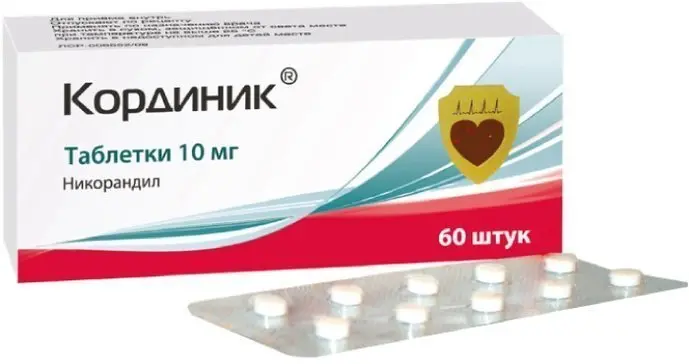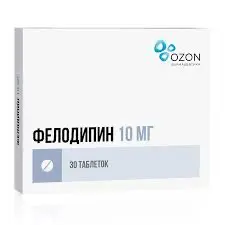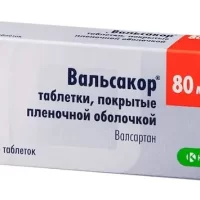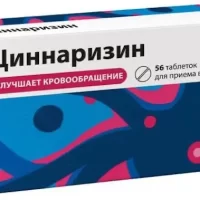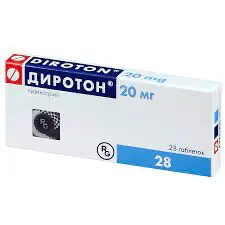Description
Cordinic Pharmacodynamics
Nicorandil (ester of Y-(2-hydroxyethyl) nicotinamide and nitric acid) is a vasodilator with a dual mechanism of action, causing relaxation of smooth muscle cells of arterial and venous vessels.
It has the ability to open ATP-dependent potassium channels. Through activation of ATP-dependent potassium channels, nicorandil causes hyperpolarization of membranes of smooth muscle cells of the vascular wall, reduces Ca2+ ions influx into cytosol, which leads to relaxation of smooth muscles, dilation of arteries and reduction of afterload. In addition, the activation of ATP-dependent potassium channels of mitochondria leads to cardioprotective effects by simulating ischemic preconditioning.
Due to the presence of a nitrate group in its composition, nicorandil also relaxes smooth muscle (especially in the venous system) by increasing intracellular cyclic guanosine monophosphate (cGMP). This leads to an increase in the volume of capacitive blood vessels and a decrease in preload.
It was shown that nicorandil has a direct effect on coronary arteries (both on unchanged and stenotic segments) without leading to the development of the phenomenon of “stealing”. In addition, reduction of end-diastolic pressure and wall tension reduces the extravascular component of coronary vascular resistance. Ultimately, this leads to improved oxygenation and increased blood flow in poststenotic areas of the myocardium.
In addition, in vitro and in vivo studies have found that nicorandil has antispasmodic activity and eliminates coronary artery spasm induced by methacholine or noradrenaline.
Nicorandil has no direct effect on myocardial contractile function. Nicorandil has no effect on lipid metabolism and glucose metabolism.
Indications
Symptomatic treatment of stable angina pectoris in adults with insufficient effectiveness, contraindications or intolerance to first-line antianginal drugs (such as beta-adrenoblockers and / or “slow” calcium channel blockers).
Contraindications
– Hypersensitivity to Nicorandil or any of the ingredients of the drug;
– Patients in shock (including cardiogenic shock), with severe hypotension or left ventricular function insufficiency with low filling pressure or decompensated cardiac activity;
– concomitant use with phosphodiesterase-5 inhibitors (sildenafil, vardenafil, tadalafil);
– concomitant use with soluble guanylate cyclase inhibitors (such as riociguat);
– hypovolemia;
– pulmonary edema;
– pregnancy and breastfeeding (see section “Use in pregnancy and breastfeeding”);
– children under 18 years of age (efficacy and safety have not been established).
Dosage and administration method
- To the mouth, without chewing, with water, regardless of the time of the meal.
- The effective therapeutic dose and the frequency of administration is chosen individually, depending on the severity of the symptoms, the response to treatment and tolerability. The maximum daily dose of nicorandil is 80 mg.
- The drug is usually prescribed in a dose of 10 to 20 mg 2-3 times a day. The recommended starting dose of nicorandil is 10 mg 2 times a day.
- In patients prone to headaches, the initial dose of the drug may be reduced to 5 mg 2 times a day.
- Special patient groups Elderly age
- There are no special requirements for the dosing regimen of nicorandil in elderly patients, but it is recommended to use Cordinia at the lowest effective dose.
- Patients with impaired hepatic and/or renal function
- In patients with impaired hepatic and/or renal function, dosage adjustment of Cordinic* is not required.

